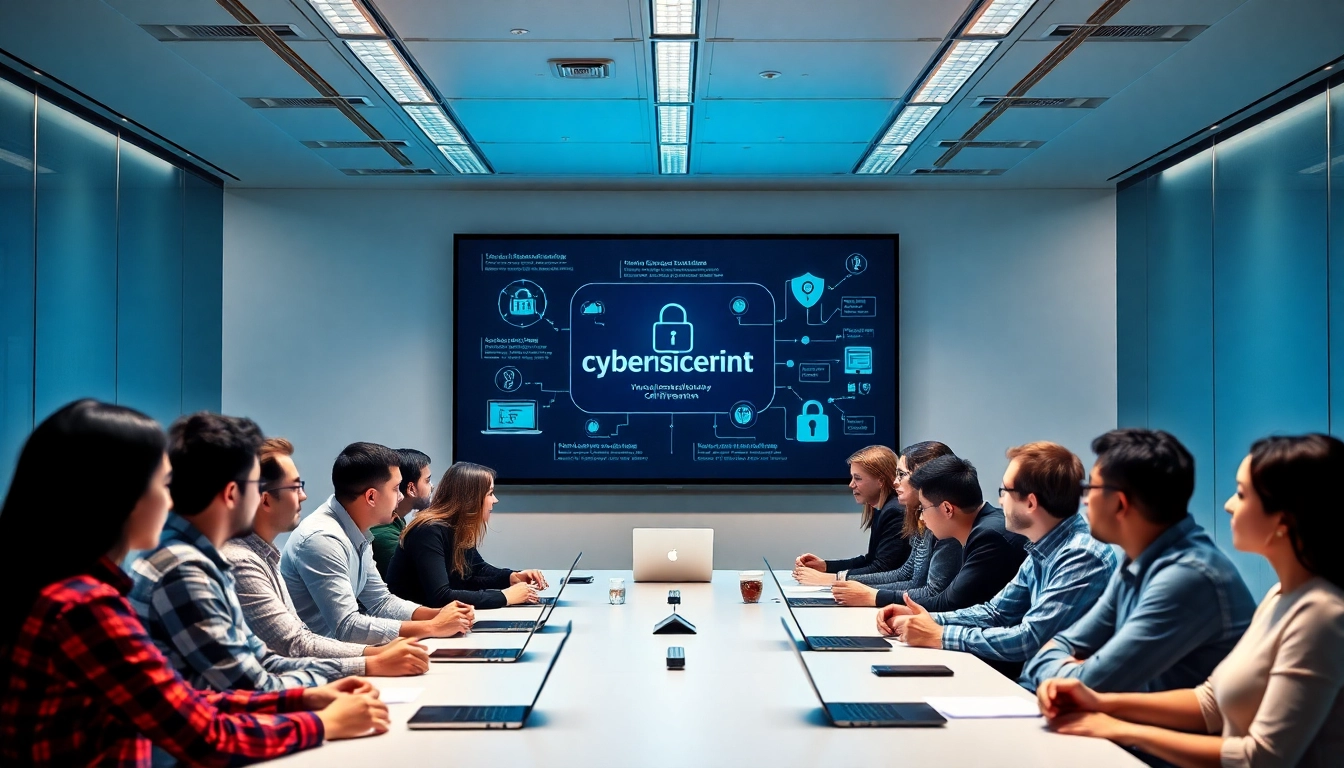Understanding Cybersecurity Certification
What is Cybersecurity Certification?
Cybersecurity certification is a process that validates an individual’s skills, knowledge, and expertise in the field of cybersecurity. It serves as an official acknowledgment from recognized bodies that the certified individual is proficient in various cybersecurity topics, practices, and technologies. The certification process typically includes training and examinations to assess the candidate’s ability to protect computer systems, networks, and data from cyber threats.
Obtaining a cybersecurity certification can significantly enhance one’s career prospects, increase job opportunities, and prove their commitment to professional development. As cyber threats become increasingly sophisticated, the demand for certified professionals is soaring.
Types of Cybersecurity Certifications
There are various types of cybersecurity certifications available, each designed to cater to different levels of expertise and specialized areas within the cybersecurity domain. Here are some of the most notable certifications:
- Certified Information Systems Security Professional (CISSP): One of the most recognized certifications, CISSP validates an individual’s ability in designing, implementing, and managing a best-in-class cybersecurity program.
- Certified Ethical Hacker (CEH): This certification focuses on identifying vulnerabilities from an attacker’s viewpoint and imparting skills necessary to safeguard networks and data.
- Certified Information Security Manager (CISM): Geared towards management, this certification focuses on overseeing and managing an enterprise’s information security program.
- CompTIA Security+: A vendor-neutral certification, it is widely regarded as an entry-level credential that demonstrates fundamental security skills.
- Certified Information Systems Auditor (CISA): This certification is designed for individuals who audit, control, monitor, and assess an organization’s information technology and business systems.
The Importance of Certification in Cybersecurity
The significance of cybersecurity certifications cannot be overstated. In a landscape marked by constant evolution and increasing cyber threats, certifications serve several critical roles, including:
- Industry Recognition: Certifications are often seen as a benchmark for skills and knowledge in the industry, enhancing a candidate’s credibility.
- Competitive Edge: As the job market becomes increasingly competitive, having a certification can set candidates apart from their peers.
- Knowledge and Skill Development: The preparation process for certification exams fosters continuous learning, keeping professionals abreast of the latest cybersecurity trends and technologies.
- Career Advancement: Many employers prioritize candidates with certifications when hiring or promoting, providing a clear pathway for career growth.
- Networking Opportunities: The certification community often provides networking benefits, connecting certified professionals with their peers and industry leaders.
Choosing the Right Cybersecurity Certification for You
Factors to Consider in Selecting a Certification
When selecting a cybersecurity certification, several factors should be taken into account:
- Career Goals: Understanding your long-term career objectives is imperative. Determine what roles you aspire to hold and choose a certification that aligns with those goals.
- Current Skill Level: Evaluate your existing knowledge and skills. Choose certifications that are appropriate for your current expertise level—whether entry-level or advanced.
- Industry Demand: Research the certifications that are currently in demand within your target industry. This can help ensure your chosen certification adds value to your résumé.
- Certification Format: Consider how the certification is administered (online vs. in-person), the length of the program, and any prerequisites or ongoing requirements for maintenance.
- Cost: Evaluate the financial investment required, including study materials, exam fees, and any additional certification maintenance costs.
Comparing Different Cybersecurity Paths
Cybersecurity offers multiple career paths, including network security, information security, ethical hacking, and more. It is crucial to compare these paths to find the right fit:
- Network Security: Focuses on protecting network infrastructure and integrity, essential for roles such as Network Security Engineer.
- Application Security: Concentrates on securing software applications against vulnerabilities, ideal for Software Security Developers.
- Incident Response: Encompasses identifying and responding to breaches, placing emphasis on certifications like Certified Incident Handler (CIH).
- Forensics: Involves recovering and analyzing data from breaches, appealing for roles such as Digital Forensic Analyst.
Assessing Your Career Goals with Cybersecurity Certification
Understanding your career aspirations is vital when selecting a certification. Questions to consider include:
- What type of roles do you see yourself in within the cybersecurity landscape?
- Are you more interested in the technical aspects of cybersecurity, such as penetration testing, or managerial responsibilities, like overseeing a cybersecurity team?
- How much time are you willing to invest in preparation and ongoing education?
- Do you prefer vendor-specific certifications or those that are widely recognized across various platforms?
The Process of Obtaining Cybersecurity Certification
Steps to Prepare for Certification Exams
Obtaining a cybersecurity certification requires a structured preparation process. Here are key steps to consider:
- Research: Investigate different certifications to determine which aligns with your career goals.
- Registration: Once you’ve selected a certification, register for the exam and check the exam prerequisites.
- Create a Study Plan: Develop a timeline for your study plan, allocating specific time slots each week for focused study.
- Hands-on Practice: Engage in practical exercises using labs, simulation tools, and real-world scenarios to reinforce your learning.
- Practice Exams: Take practice exams to evaluate your readiness and identify areas that require additional focus.
Study Materials and Resources for Certification
Choosing the right study materials is key to exam success. Consider the following resources:
- Official Certification Guides: Many certifying bodies provide official study guides and resources.
- Online Learning Platforms: Websites like Coursera, Udemy, and LinkedIn Learning offer courses tailored to various certifications.
- Books and E-books: Utilize recommended books that provide comprehensive coverage of exam topics.
- Study Groups: Join online forums and study groups to discuss concepts and share knowledge with fellow candidates.
Exam Registration and What to Expect
After preparing for the exam, follow these steps to register:
- Go to the official certification website to register.
- Choose your exam date and location or opt for online testing if available.
- Review exam guidelines, including format, length, and scoring.
- Pay the registration fee to secure your place.
On exam day, ensure you arrive early, bring any required identification, and be well-rested for optimal performance.
Best Practices to Excel in Cybersecurity Certification Exams
Effective Study Techniques for Cybersecurity Topics
Adopting effective study techniques can significantly enhance your exam preparation:
- Active Learning: Engage with the material actively by taking notes, participating in discussions, and teaching concepts to others.
- Visual Aids: Utilize flowcharts, diagrams, and mind maps to visualize complex concepts.
- Regular Reviews: Schedule weekly reviews of key topics to reinforce memory retention.
- Simulation Labs: Enroll in labs that mimic real-world scenarios to apply your knowledge hands-on.
Time Management During Study and Preparation
Effective time management is crucial when preparing for certification exams. Here are some strategies:
- Prioritize Topics: Based on exam weightage, prioritize the most critical areas for study.
- Set Time Limits: Allocate specific time slots for studying each topic to maintain focus and avoid burnout.
- Create a Calendar: Use a visual calendar to track study sessions, deadlines, and exam schedules.
- Avoid Procrastination: Break large tasks into smaller, manageable pieces to maintain motivation and address any overwhelming feelings.
Handling Exam Anxiety and Improving Performance
Examination pressure can result in anxiety, which can hinder performance. To mitigate stress, consider the following techniques:
- Practice Mindfulness: Engage in mindfulness exercises like meditation or deep-breathing techniques to help calm nerves.
- Simulate Exam Conditions: Practice taking exams in a simulated environment to familiarize yourself with the format and reduce anxiety.
- Stay Positive: Cultivate a positive mindset by reinforcing affirmations and visualizing your success.
- Physical Wellness: Maintain a balanced diet, regular exercise, and adequate sleep leading up to the exam day to bolster your mental health.
Future Trends in Cybersecurity Certification
Emerging Certifications in Cybersecurity
The field of cybersecurity is continuously evolving, leading to the emergence of new certifications aimed at addressing contemporary challenges. Some certifications gaining traction include:
- Certified Cloud Security Professional (CCSP): With the rapid adoption of cloud services, this certification focuses on cloud security architecture, governance, risk, and compliance.
- Certified Blockchain Security Expert (CBSE): As blockchain technology becomes more prevalent, this certification aims to ensure experts can safeguard blockchain assets and applications.
- Internet of Things Security Foundation (IoTSF) Certification: With the growth of IoT devices, this certification ensures practitioners are equipped to secure connected devices and networks.
The Role of Continuing Education in Cybersecurity
To remain competitive in the cybersecurity landscape, continuing education is vital. Employers often seek professionals who are committed to lifelong learning, which may include:
- Attending workshops and conferences to learn about the latest technologies.
- Participating in webinars to engage with industry experts.
- Enrolling in advanced training programs to specialize in specific areas of cybersecurity.
- Obtaining additional certifications that further validate skills and expertise.
How to Stay Updated in an Evolving Cybersecurity Landscape
The cybersecurity field evolves rapidly; thus, staying informed is essential. Here are effective strategies:
- Follow Industry News: Subscribe to cybersecurity news websites, blogs, and newsletters to stay abreast of recent developments.
- Join Professional Associations: Memberships in organizations such as (ISC)², ISACA, or ACSA provide valuable resources and networking opportunities.
- Engage in Cybersecurity Communities: Participate in forums and online communities to connect with peers and share insights.
- Continuous Training: Regularly invest time in further education and professional development courses to expand your knowledge base.



